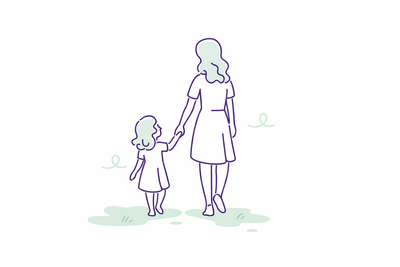
Our way of expressing ourselves greatly influences how we relate to others, whether they are children, teenagers or adults, specifically in the following situations:
- When we want to ask someone to do something.
- When we want to remind someone of a norm or limit.
- When we want to let somebody know that we don't like what they're doing.
These situations occur many times a day, especially when dealing with children. And our way of expressing ourselves greatly influences the response we will receive from the other person.
This has a lot to do with assertive communication. Assertiveness is the skill of expressing our point of view in a clear and totally respectful way. For example: My 4 year old boy wants to go to the park, but his toys are all over the floor in his bedroom. I can talk to him in several ways:
“As you do not tidy up your toys, you won’t go to the park”
“We won’t go to the park until you tidy up your toys”
“We will go to the park as soon as you finish tidying up your toys”
Which of these sentences sounds better to you? If someone said them to you, which one would encourage you to tidy up your toys willingly? The simple fact of choosing one or the other of these sentences can make the difference between an effective communication and a power struggle (and as you’ve surely experienced in your life, power struggles do not lead to anything good… in the end, nobody wins).
It’s not a secret that we are more inclined to do something we’re asked to if we perceive it in a positive way, without aggressiveness or threats.
The hard part is to put it into practice on a day-to-day basis, because it means “unlearning” sentences and ways of expressing ourselves that are deep-rooted in ourselves from our own childhood, and replace them with more positive expressions. Practice is key, at first it’s hard to find a way to say a certain sentence in a positive way, but when you get used to it, eventually it’ll feel like second nature.
To make it easier for you, here’s 10 common expressions and their more positive versions. You don’t have to use these sentences, they are simply examples to give you inspiration to then create your own positive expressions 😉
- Tidy up your toys so we can go to the park → We're going to the park as soon as you tidy up your toys
- Give me your hand to cross the street → We can cross the street when you give me your hand
- Please don't interrupt your sister. I can't hear if you both talk at the same time → I will be very happy to listen to you when your sister finishes talking
- If you are not quiet I won't read the book → I will start reading the book when there is silence
- Stop bothering your brother or I'll send you to your room → If we want to be here all together we must respect each other
- Please don't shout → I listen to people who don't shout
- I don't allow you to talk to me like this → We can continue this conversation when there is respect on both sides
- You don't go out without a jacket → You can go outside when you put on a jacket
- You can't play if you don't respect the rules → I order to play this game, we all have to respect the rules
- Listen to me, I have to tell you something important → I have to tell you something important, I'll do it when you listen to me
Something that usually works very well is to think about what situations require this kind of sentences and practice the positive versions we want to start using. If we have already “rehearsed”, it will be easier to have that new expression ready when we need to use in the heat of the moment.
The challenge I suggest for this month is to replace the expressions that you use regularly with your children and that you feel that neither work nor make you feel good, and instead express them in a more positive, effective and respectful way. I encourage you to try it not only with your children, but also with adults, it has no age! 🙂
This is a translation of a post by Cristina from Montessori en Casa that I loved and found very helpful.
It’s difficult for a parent to implement it in their daily life, but in my experience with Oliver so far, I’ve noticed many times what a huge difference it makes to express requests in a positive way. It not only helps avoiding power struggles (which you never ever win with a toddler), but it also helps keeping everybody in a good mood and getting things done. I hope it’ll help you too.
































